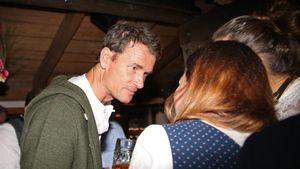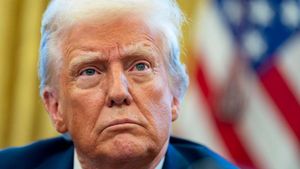SEOUL, South Korea (AP) — North Korea has emphatically condemned U.S. Secretary of State Marco Rubio for characterizing the nation as a "rogue state," signifying the first direct critique of the Trump administration from Pyongyang. The response, delivered through the North Korean Foreign Ministry, dismissed Rubio's remarks as "coarse and nonsensical," and warned such statements would not serve U.S. interests.
This statement is part of broader signals from North Korea indicating its reluctance to re-engage diplomatically with the United States, even as President Donald Trump has expressed intentions of reaching out to North Korean leader Kim Jong Un.
"The hostile words and deeds of the person who is in charge of U.S. foreign policy served as an occasion to confirm once again the U.S. hostile policy toward the DPRK (Democratic People's Republic of Korea), which remains unchanged," stated the Foreign Ministry. It argued, "Rubio’s coarse and nonsensical remarks only show directly the incorrect view of the new U.S. administration on the DPRK and will never help promote U.S. interests as he wishes." This rebuke came after Rubio’s appearance on "The Megyn Kelly Show" on January 30, where he labeled North Korea, along with Iran, as "rogue states" amid discussions on foreign policy challenges.
North Korea's latest rebuff hints at its entrenched stance against U.S. overtures. Despite Trump's hopes for renewed talks, Kim Jong Un appears focused on bolstering his military alliances, particularly with Russia, amid the continuing conflict stemming from the Russia-Ukraine war. Many analysts agree this involvement marks North Korea's first significant participation outside its borders since the Korean War.
Moon Seong Mook, an expert from the Korea Research Institute for National Strategy, noted, "Now, Kim Jong Un is desperate to maintain the unshakable alliance with Russia, but it remains to be seen whether Russia would provide the support Kim is seeking as the war evolves."
The timing of Rubio's comments aligns with Trump’s previous remarks about Kim, where he characterized the North Korean leader as "a smart guy" and asserted plans to reach out to him again. Trump famously met Kim three times during his presidency, making headlines for becoming the first sitting U.S. president to engage directly with North Korea's leader.
There were early hopes for denuclearization agreements during these summits, which, unfortunately, fell apart following disputes on U.S. sanctions and what North Korea would be willing to offer. Many observers noted Kim's domestically-driven desire to uphold the regime's image following the perceived humiliations from these diplomatic failures.
"Kim personally suffered huge humiliation due to the no-deal summit in Hanoi," said Kwak Gil Sup, head of One Korea Centre. The breakdown of these negotiations pushed Kim to reaffirm his focus on enhancing North Korea's nuclear capabilities, which he insists are necessary for countering perceived threats from the U.S. and its allies.
Even without direct engagements, Kim continues to push his agenda of developing North Korea's military strengths. A recent report indicated Kim visited sites related to nuclear material production, showcasing his commitment to increasing North Korea's military prowess. During this visit, he encouraged advancements to counter challenges posed by "hostile forces," which most analysts interpreted as referring to the U.S. and South Korea.
Despite the lack of formal responses to Trump's overtures, the anxiety surrounding Pyongyang’s nuclear advancement remains palpably high. North Korea has continued its weapons testing and belligerent rhetoric, recently promising to enact the "toughest" anti-U.S. policies. The growing alliance with Russia has helped North Korea deflect heightened pressures from the U.S., thereby encouraging Kim to reinforce military ties.
Former President Trump has remained optimistic about the possibility of renewed diplomacy, as he reaffirmed his personal rapport with Kim, which he considers significant. Trump indicated he is open to contacting Kim again, stirring speculation about the future of U.S.-North Korea relations.
With Kim prioritizing his partnership with Russia, it complicates any roadmap for U.S.-North Korea engagement. While Kim Jong Un appears steadfastly committed to amplifying North Korea’s nuclear capabilities, questions remain about the sustainability of his alliance with Russia moving forward.
The culmination of these elements paints a precarious picture for any potential diplomatic initiatives. The U.S. finds itself contending with North Korea's shifted priorities alongside considerable military commitments to Russia, making it ambivalent to any overtures offered from Washington, especially as sentiments harden within the North Korean leadership.
Given the realities on the ground, it seems unlikely Kim’s regime will quickly embrace U.S. overtures. The real stories of resilience, ambition, and the relentless pursuit of military advancements linger at the forefront as North Korea navigates its place within the broader geopolitical tensions.



